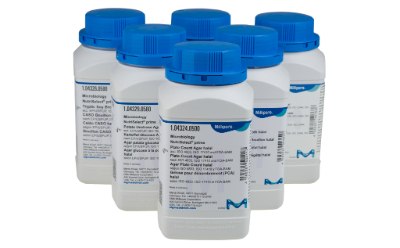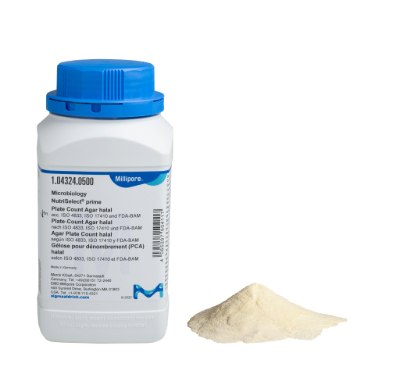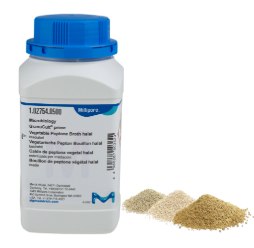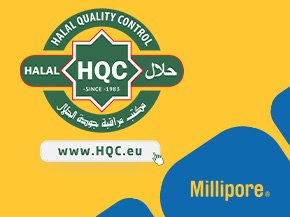Halal & Kosher Certified Microbial Culture Media
Importance of using halal-certified media and its impact on maintaining halal integrity of end-users products
In today's diverse market, halal certification has become crucial for companies in the food, pharmaceutical, beverage, and cosmetics industries. As the demand for halal products continues to rise among Muslim and Jewish consumers, stricter halal regulations are paramount. This compliance extends beyond the final products; it includes every aspect of production, including raw materials and tools that may not directly contact the product. Among these critical components are culture media used for monitoring microbial contamination in production environments.
Non-compliance can jeopardize the halal status of entire production facilities and their end products. To address these challenges, we are proud to introduce a new range of dehydrated culture media for microbiological quality control that is both halal and kosher certified. These products are specifically designed for environmental monitoring (air, surface, and personnel) and aseptic process simulations (media fill trials).
Halal and Kosher Dehydrated Culture Media
As a leading worldwide supplier of products and solutions for microbiological testing and monitoring across the pharmaceutical, cosmetics, food, and beverage industries, we offer our culture media as powdered media (NutriSelect® media) or superior, low-dust granulated media (GranuCult® media).
Branding of Our Dehydrated Culture Media

Our fully halal and kosher certified culture media come with clear information on the origin and processing of each biological component. These media are ideal for sterility testing in aseptic filling lines and for preparing standard agar plates, contact plates, dip slides, and other formats used in hygiene monitoring and microbiological quality control (QC) testing. This ensures compliance for halal and kosher certified manufacturers.
Each of our halal and kosher certified culture media comes with its own halal and kosher certificate, which is available for download from the product page on our website. Each product is annually reviewed by internationally recognized certifying bodies and is extended when all halal and kosher criteria are met.
Buffered Peptone Water (BPW): Suitable for swab/sponge sampling in food and beverage production. Media specifications from regulatory bodies and typical compositions from media suppliers do not indicate animal origin of ingredients.
Tryptic Soy Agar (TSA): suitable for determining total aerobic counts from surfaces and air in pharmaceutical production facilities. Media specifications from regulatory bodies and typical compositions from media suppliers do not indicate animal origin of ingredients.
How to Identify Our DCM with QC Release Under EN ISO/IEC 17025 Accreditation acc. EN ISO ISO 11133?
The culture media we offer are available in three QC levels, indicated by the brand extensions basic, plus, and prime. These reveal the degree to which they are compliant with international regulations. The prime level, for example, covers the full compliance spectrum of food, beverage, and pharmaceutical standards, including QC release under ISO accreditation for culture media described in food and beverage standards.

- Both GranuCult® and NutriSelect® dehydrated culture media offers different QC levels: prime, plus, basic.
- Only GranuCult® prime and NutriSelect® prime dehydrated culture media offers are QC released under accreditation.
- Prime is the highest QC media, wherein the QC is performed in compliance with international norms and guidelines (e.g., ISO, EP, USP, FDA-BAM, USDA, IFU)
- Plus is the medium QC media, wherein the QC is performed according to industry standards and company standards (e.g., Coca Cola, Heineken, others)
Explore our range of Halal and Kosher-certified Culture Media and ensure halal-compliance in your production facility.
Halal and Kosher Culture Media for Media Fill Tests
The performance of aseptic manufacturing procedures must regularly be assessed by so-called media fill tests (also known as a “process simulation tests”). In these microbiological simulations the pharmaceutical or beverage product is replaced by a sterile culture medium.

- Vegetable Peptone Broth halal and kosher media (GranuCult® prime) for use in the pharmaceutical industry, irradiated and triple-packed.
- Linden Grain Medium halal and kosher media (NutriSelect® plus) for aseptic beverage bottling and ice-crusher installations (can also be used after freezing and thawing).
The formulation of the Vegetable Peptone Broth halal and kosher is prepared according to the recommendations of the current European and United States Pharmacopoeia (EP, 2.6.12. and USP, 61), but contains peptones of non-animal origin instead of the recommended peptones.
HALAL CONSIDERATIONS AND PRODUCTS
Implications Your Culture Media Could Have for Your Halal Certification
Culture media that raise significant concerns are those containing peptones, which are derived from both animal and non-animal proteins, typically deemed non-halal. Tryptic peptone, a nutrient-rich base for microbial growth, is produced by degrading proteins like casein using trypsin from porcine pancreas. As a result, culture media with treated peptones are classified as containing pork material by halal certification bodies, making them non-halal. The use of such non-halal culture media in manufacturing areas for halal-certified products can jeopardize the halal status of both the entire production facility and the end products manufactured in it. Learn more in our webinar.
Halal Certification of Products and Production Facilities
Independent institutions exist that review and certify manufacturing facilities, processes, and products for compliance with accepted halal reference standards. They are accredited by halal authorities and bodies such as MUI Indonesia, Jakim Malaysia, GAC GCC incl. UAE, and HAC Sri Lanka. The main organization under which most of the international accredited halal certification bodies around the globe work is the Halal Food Council.
Meeting the Needs of Halal-Certified Manufacturers
We have developed a range of fully halal-certified culture media that come with clear information about the origin and processing of each biological component. Manufacturers can use these products to prepare contact plates, dip slides, and other formats used for microbiological quality control (QC) testing in halal-certified production areas without implications for their halal status.
These halal culture media comply with both Islamic teaching and specified international regulations. They are:
- Free of non-halal contamination
- Certified annually according to JAKIM MS and MUI HAS halal standards
- Compliant with ISO, EP, USP, JP, and FDA-BAM standards (if designated “prime”)
Note that most of our halal-certified products are also kosher-certified.
KOSHER CONSIDERATIONS AND PRODUCTS
Implications Your Culture Media Could Have for Your Kosher Certification
In addition to avoiding non-kosher ingredients, kosher manufacturing of culture media involves some specific challenges. For example, milk-derived ingredients may not be mixed with other animal-derived ingredients, and there are strict rules regarding the storage of materials and packaging. Equipment, too, can take on a non-kosher character if it has come into contact with non-kosher substances. It should not be used for kosher processes involving heating because the contacted raw materials would also become non-kosher. Where heat is used in processing, for example when producing culture media, dedicated equipment should be used. In cases where this is not feasible, it is possible to resort to kashering, the process of kosherizing equipment. This involves applying heat equivalent to cooking, typically steam, to the equipment under the direct supervision of a rabbi.
Kosher Certification of Products and Production Facilities
Rabbis and kosher certifying agencies review and certify manufacturing facilities, processes, and products for compliance with accepted kosher standards. Among the organizations are KF Kosher, the kosher foods department of the Federation of Synagogues, and Fidelity Kosher.
Meeting the Needs of Kosher-certified Manufacturers
Almost all of our halal certified culture media are also certified as kosher (excluding Passover) for use in food, beverage, pharmaceutical and cosmetics applications. Our range of kosher-certified culture media comes with individual certificates for each product, available on our website. These media can be used for contact plates, dip slides and further formats applied for microbiological quality control purposes in kosher manufacturing areas to make sure there are no implications for their status. These kosher certified culture media comply not only with Jewish dietary laws, but also with specified international regulations. They are:
- Free of non-kosher contamination
- Certified annually by the KF Kosher and Fidelity Kosher certifying agencies
- Compliant with ISO, EP, USP, JP, and FDA-BAM standards (if designated “prime”)
Note that all our kosher-certified culture media are also halal-certified.
Related Products
To continue reading please sign in or create an account.
Don't Have An Account?